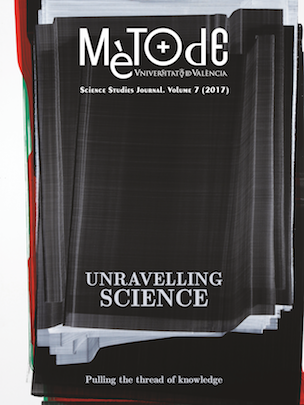Space, time, and irreversibility: The philosophical problems of contemporary astrophysics
DOI:
https://doi.org/10.7203/metode.7.8478Paraules clau:
ontology, space-time, epistemology, black holes, gravitational waves Resum
Resum
Scientific philosophy is that which is informed by science. It uses exact tools such as logic and mathematics and provides a framework for scientific activity to solve more general questions about nature, the language we use to describe it, and the knowledge we obtain thanks to it. Many of the scientific philosophy theories can be proven and evaluated using scientific evidence. In this paper, I focus on showing how several classical philosophy topics, such as the nature of space and time or the dimensionality of the future, can be addressed philosophically using the tools from current astrophysics research and, in particular, from the study of black holes and gravitational waves.
 Descàrregues
Descàrregues
 Referències
Referències
Boltzmann, L. (1974). Theoretical physics and philosophical problems: Selected writings. Dordrecht: Reidel.
Bunge, M. (1974-1989). Treatise on basic philosophy. Dordrecht: Kluwer.
Ferrater-Mora, J. (1994). Diccionario de filosofía. Barcelona: Ariel.
Novello, M., & Perez-Bergliaffa, S. E. (2008). Bouncing cosmologies. Physics Reports, 463(4), 127–213. doi: 10.1016/j.physrep.2008.04.006
Reichenbach, H. (1977). Der aufstieg der wissenschaftlichen philosophie. Wiesbaden: Wiever Verlagsgesellschaft.
Rescher, N. (2001). Nature and understanding: The metaphysics and methods of science. Oxford: Oxford University Press.
Romero, G. E. (2012). Parmenides reloaded. Foundations of Science, 17(3), 291–299. doi: 10.1007/s10699-011-9272-5
Romero, G. E. (2013a). From change to spacetime: An eleatic journey. Foundations of Science, 18(1), 139–148. doi: 10.1007/s10699-012-9297-4
Romero, G. E. (2013b). Adversus singularitates: The ontology of space–time singularities. Foundations of Science, 18(2), 297–306. doi: 10.1007/s10699-012-9309-4
Romero, G. E. (2015). Present time. Foundations of Science, 20(2), 135–145. doi: 10.1007/s10699-014-9356-0
Romero, G. E. (2017). On the ontology of spacetime: Substantivalism, relationism, eternalism, and emergence. Foundations of Science, 22(1), 141–159. doi: 10.1007/s10699-015-9476-1
Romero, G. E., & Pérez, D. (2011). Time and irreversibility in an accelerating universe. International Journal of Modern Physics D, 20(14), 2831–2838. doi: 10.1142/S021827181102055X
Romero, G. E., & Vila, G. S. (2014). Introduction to black hole astrophysics. Heidelberg: Springer.
Stolpovskiy, M. (2016, March, 19-26). QUBIC Experiment. Conference 51th Rencontres de Moriond, La Thuile, Italy. Retrieved from https://arxiv.org/pdf/1605.04869v1.pdf
Descàrregues
Publicades
Com citar
-
Resum1461
-
PDF 613
Número
Secció
Llicència
![]()
Tots els documents inclosos en OJS són d'accés lliure i propietat dels seus autors.
Els autors que publiquen en aquesta revista estan d'acord amb els següents termes:
- Els autors conserven els drets d'autor i garanteixen a la revista el dret a la primera publicació del treball, llicenciat baix una llicència de Reconeixement-NoComercial-SenseObraDerivada 4.0 Internacional de Creative Commons, que permet a altres compartir el treball amb un reconeixement de l'autoria del treball i citant la publicació inicial en aquesta revista.
- Es permet i s'anima els autors a difondre la versió definitiva dels seus treballs electrònicament a través de pàgines personals i institucionals (repositoris institucionals, pàgines web personals o perfils a xarxes professionals o acadèmiques) una vegada publicat el treball.





